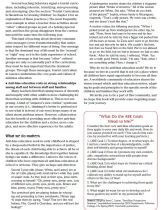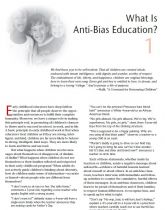Studijní materiál: Anti-Bias Education for Young Children and Ourselves
Skrýt detaily | Oblíbený- Kvalita:91,3 %
- Typ:Studijní materiál
- Univerzita:Univerzita Hradec Králové
- Fakulta:Pedagogická fakulta
- Kategorie:Humanitní vědy
- Podkategorie:Pedagogika
- Předmět:Multikulturní výchova a vzdělávání
- Autor:kungs
- Ročník:3. ročník
- Rozsah A4:13 strán
- Zobrazeno:1 232 x
- Stažené:0 x
- Velikost:0,9 MB
- Formát a přípona:PDF dokument (.pdf)
- Jazyk:český
- ID projektu:9807
- Poslední úprava:06.03.2017
What Is Anti-Bias Education?
Early childhood educators have deep faith in the principle that all people deserve the opportunities and resources to fulfi ll their complete humanity. Moreover, we have a unique role in making this principle real, in promoting all children’s chances to thrive and to succeed in school, in work, and in life. A basic principle in early childhood work is that when educators treat children as if they are strong, intelligent, and kind, children are far more likely to behave in strong, intelligent, kind ways. They are more likely to learn and thrive and succeed.
But what happens when children receive messages about themselves of disapproval, of disdain, of dislike? What happens when children do not see themselves or their families refl ected and respected in their early childhood programs? When adults do not actively guide children’s thinking about diversity, how do children make sense of information—accurate or biased—about people who are different from themselves?
Early childhood educators have deep faith in the principle that all people deserve the opportunities and resources to fulfi ll their complete humanity. Moreover, we have a unique role in making this principle real, in promoting all children’s chances to thrive and to succeed in school, in work, and in life. A basic principle in early childhood work is that when educators treat children as if they are strong, intelligent, and kind, children are far more likely to behave in strong, intelligent, kind ways. They are more likely to learn and thrive and succeed.
But what happens when children receive messages about themselves of disapproval, of disdain, of dislike? What happens when children do not see themselves or their families refl ected and respected in their early childhood programs? When adults do not actively guide children’s thinking about diversity, how do children make sense of information—accurate or biased—about people who are different from themselves?


